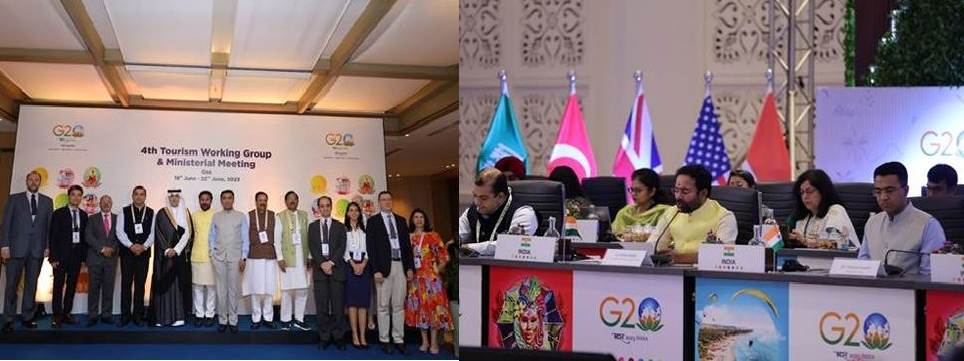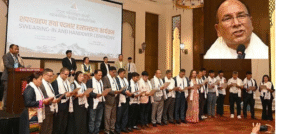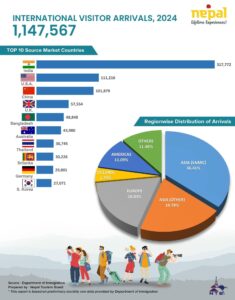G20 Tourism Working Group stresses on implementation of Sustainable Development Goals

Travel Biz News —-
The 4th Tourism Working Group Meeting under G20 has urged all the stakeholders to support the vision of placing tourism high in the national and international agendas and processes related to the implementation of the Sustainable Development Goals and express the importance of working together in this direction.
The Prime Minister, Narendra Modi addressed the G20 Tourism Ministers’ Meet held in Goa , India via video message on June 21 .
India’s Union Minister for Tourism, Culture G.Kishan Reddy, Minister of State for Tourism Ajay Bhatt; Minister of State for Tourism Shripad Yesso Naik and Chief Minister of Goa Pramod Sawant addressed the inaugural session of the meeting .
Full text of Outcome Document and Chair’s Summary of G20 Tourism Ministerial Meeting Goa, India held on 21 June 2023
Preamble
1. We, the Ministers of Tourism of the G20 member countries, met in Goa, India, on June 21 2023, to reaffirm the importance of working towards the full recovery of tourism from the impacts of the COVID 19 pandemic and advancing the role of tourism in accelerating the implementation of the United Nations 2030 Agenda for Sustainable Development and the achievement of its Sustainable Development Goals (SDGs).
2. We support the five tourism priority areas identified by India’s G20 Presidency for the Tourism Working Group for the development of a resilient and sustainable tourism sector namely: 1) Green Tourism; 2) Digitalization; 3) Skills; 4) Tourism MSMEs and 5) Destination Management.1
3. As articulated by the previous G20 Tourism Ministers’ Declarations and Statements, we believe that tourism significantly contributes to the main objective of the G20 which is to promote “strong, sustainable, balanced and inclusive growth” and we will work towards positioning the sector in accelerating sustainable development and achieving the SDGs.
4. The war in Ukraine has further adversely impacted the global economy. There was a discussion on the issue. We reiterated our national positions as expressed in other fora, including the UN Security Council and the UN General Assembly, which, in Resolution No. ES11/1 dated 2 March 2022, as adopted by majority vote (141 votes for, 5 against, 35 abstentions, 12 absent) deplores in the strongest terms the aggression by the Russian Federation against Ukraine and demands its complete and unconditional withdrawal from the territory of Ukraine. Most members strongly condemned the war in Ukraine and stressed it is causing immense human suffering and exacerbating existing fragilities in the global economy – constraining growth, increasing inflation, disrupting supply chains, heightening energy and food insecurity, and elevating financial stability risks. There were other views and different assessments of the situation and sanctions. Recognizing that the G20 is not the forum to resolve security issues, we acknowledge that security issues can have significant consequences for the global economy.2
5. It is essential to uphold international law and the multilateral system that safeguards peace and stability. This includes defending all the Purposes and Principles enshrined in the Charter of the United Nations and adhering to international humanitarian law, including the protection of civilians and infrastructure in armed conflicts. The use or threat of use of nuclear weapons is inadmissible. The peaceful resolution of conflicts, efforts to address crises, as well as diplomacy and dialogue, are vital. Today’s era must not be of war.
6. We highlight the crucial role of tourism as a means for sustainable socio- economic development and economic prosperity and agree that the transformation of the sector must be at the forefront of tourism policies and that tourism policies must explicitly prioritize sustainability, inclusion and resilience in the spirit of the theme of India’s G20 Presidency: One Earth, One Family, One Future.
7. We believe that the sector needs a holistic approach that promotes a cycle of economic, social, environmental sustainability, and we recognize that it will require a whole of government approach in G20 countries, cross-sectoral coordinated policies across the different levels of government together with the employers’ and workers’ organizations, private sector and local populations as well as new, inclusive and innovative financing models while taking into account national circumstances, needs and priorities.
8. We recognize the importance of advancing the concept of Lifestyle for Environment (LiFE) which focuses on conserving our planet precious natural resources through the application of the circular approaches of reduce, reuse and recycle and living in harmony with nature through the efforts of individuals and populations resulting in a global mass movement of positive behavioral change that could serve as an accelerator for achieving the SDGs in the tourism sector.
9. We reaffirm our commitment to advance gender equality and the empowerment of women through tourism polices and initiatives.
10. We welcome the Goa Roadmap for Tourism as a vehicle for achieving the Sustainable Development Goals, as annexed, as a voluntary set of actionable policies to enable progressing tourism towards the achievement of the SDGs.
11. We recognize that the tourism sector impacts and is highly impacted by climate change, biodiversity and cultural losses and should be a driver for nature protection, climate action, economic prosperity, circularity, cultural preservation, and fighting inequalities to build greater resilience among societies.
12. We recognize the need for tourism policies to advance sustainability in infrastructure and operations; create decent and sustainable jobs; mainstream climate action to reduce emissions and encourage circular approaches; support biodiversity conservation and environment and climate friendly tourism; protect, empower and engage local residents and vulnerable groups, such as youth, women, local communities and Indigenous Peoples and persons with disabilities in tourism development and advance visitors’ action for sustainable tourism in the spirit of the Travel for LiFE.
13. We underscore that the sustainable planning and management of tourism can be enhanced through adequate data and measurement, recognize the need to advance the measurement of tourism in its three dimensions – economic, social and environmental- and acknowledge the initiative Towards a Statistical Framework for Measuring the Sustainability of Tourism (MST) launched by UNWTO with the support of the United Nations Statistics Division (UNSD).
14. We take note of voluntary global initiatives to accelerate the sustainable transformation of the tourism sector such as the One Planet Sustainable Tourism Programme, the Glasgow Declaration on Climate Action in Tourism and the Global Tourism Plastics Initiative.
15. We reaffirm the transformative impact of digital technologies on tourism. We recognize the need for integrating digitalization at every phase of the tourism life cycle both on the demand and supply sides as well as promoting digital transformation of destinations and businesses, particularly, MSMEs, while taking into account national circumstances, needs, and priorities.
16. We encourage prioritizing digital trainings and access to digital infrastructure for all to support MSMEs, and vulnerable groups, such as youth, women, local communities and Indigenous Peoples and persons with disabilities adapt and thrive and encourage the use of digital tools to advance travel facilitation and seamless travel, enhance safety and security, better infrastructure management as well as travelers’ experience.
17. We encourage countries to promote specific innovation and entrepreneurship policies and programmes in tourism to advance the sectors’ competitiveness while working on the regulations of digital technologies in tourism.
18. We encourage countries to use digital tools to share and promote environmentally friendly actions and tourism offerings based on local produce and traditional lifestyles.
19. We recall that tourism creates jobs for people of all ages and skill levels, not only directly, but also indirectly in many other sectors, including agriculture, construction, manufacturing, retail, handicrafts, cultural and creative industries, financial services, information and communication technologies.
20. We highlight that tourism is an important job creator for women, who account for 54% of the sector’s global labour force worldwide as compared to 39% in the overall economy3 yet women tend to be concentrated in the lowest paid and lowest status jobs in tourism and perform a large amount of unpaid work in family tourism businesses.
21. We recognize that women, frequently engaged in informal or casual employment, were disproportionally affected by the COVID-19 pandemic and that inequalities in the sector have increased and hard-fought gains made towards gender equality and women’s rights in recent years have reversed in some cases.
22. We recall that tourism employment faces important challenges, particularly post COVID-19 pandemic, of labour shortages; upskilling, reskilling, new skilling and digital skilling; talent attraction and retention; decent work deficits and negative perceptions. We recognize the need for transforming tourism education and skills and ensure youth’s access to high-quality and contemporary tourism education as well as to build a sector that is capable of creating decent and sustainable jobs and attracting and retaining talent providing adequate conditions for youth career development and progress.
23. We underline the importance of creating a roadmap for tourism education and career paths that includes resilient, sustainable, inclusive and universally accessible tourism and engages all stakeholders including through tripartite social dialogue at national and local levels and by strengthening industry-academia-government partnerships.
24. We emphasize the importance of identifying skills gaps to tailor education and career paths and training opportunities and build a skilled tourism workforce especially for vulnerable groups such as youth, women, local communities and Indigenous Peoples and persons with disabilities and, to leverage access to safe and decent work and we encourage members to address non-discrimination and inequality by developing specific targeted strategies and programmes.
25. We recall that MSMEs make up 80% of the tourism businesses – and in some of our countries, they can represent as much as 90%4 – and recognize that supporting innovation and dynamism for the private sector, including MSMEs and startups, requires addressing the challenges of the digital and sustainable transitions, access to finance, capacity to scale up, market knowledge and access to data and intelligence, skills, and value chain integration within the tourism sector and between tourism and other sectors.
26. We aim to enhance the support for destinations and businesses, particularly MSMEs, in their transition towards economic and environmental sustainability, social responsibility and resilience building. We encourage countries to focus on policies, regulations and interventions that empower change management and increase the capacity of tourism MSMEs for adaptability and modernization, support market practices, inclusive and innovative financing models, programmes for entrepreneurship and sensitizing visitors to prefer tourist offerings particularly those benefiting cooperatives at the local level and vulnerable groups such as youth, women, local communities and Indigenous Peoples and persons with disabilities.
27. We recognize that informality in tourism is a major challenge, affecting in particular the most vulnerable groups, such as youth, women, local communities and Indigenous Peoples and persons with disabilities, and that it is critical to advance the transitions from informal to formal economies in tourism and ensuring decent work for all.
28. We recall that the management of tourism destinations needs to be reformulated towards a holistic model that builds adequate governance and progresses sustainability, inclusion and resilience. We reiterate that the impact of the COVID-19 crisis on tourism has emphasized the need for a new model of destination management.
29. Taking into account national circumstances, needs and priorities we will endeavor, where relevant, to promote the creation of Destination Management Organizations (DMOs) as lead actors in destination management for sustainable tourism in its three pillars – economic, social and environmental as well as risk mitigation and crisis preparedness.
30. We recall the importance of strengthening tripartite social dialogue and building coordination mechanisms between governments at different levels, tourism stakeholders and DMOs to lead towards sustainable governance built on partnerships between public-private sectors and residents- at a destination level.
31. We underline the importance of measuring the impact of tourism at the local level in accordance with indicators and take note of initiatives such as the Sustainable Tourism Observatories (UNWTO’s International Network of Sustainable Tourism Observatories).
32. We encourage the development of DMOs and destination management guidelines that promote effective and adequate collaborative governance models.
33. We will continue to work together and support each other, in the true spirit of Vasudhaiva Kutumbakam, for transforming the tourism sector to meet the objectives of the SDGs and build an inclusive and sustainable future.
34. We support the vision of placing tourism high in the national and international agendas and processes related to the implementation of the SDGs and express the importance of working together in this direction.
35. The establishment of a G20 Tourism online platform of good practices on progressing the SDGs is suggested as a tool and we appreciate the leadership of India’s Presidency in building such a legacy.
36. We thank the Indian Presidency for its leadership in 2023 and look forward to our next meeting under the Brazilian Presidency in 2024. We will submit this Declaration to the G20 Leaders’ 2023 Summit.
Source : Ministry of Tourism , India
22 June , 2023














